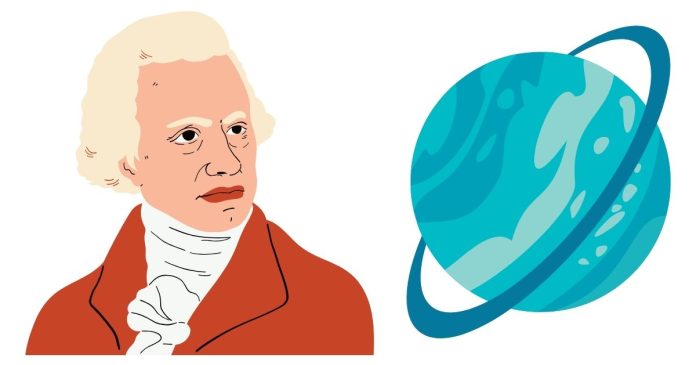The discovery of Uranus marked a significant milestone in astronomy, as it was the first planet identified with the aid of a telescope rather than the unaided human eye. This achievement is credited to William Herschel, a German-born British astronomer, in 1781. Let’s delve into how this monumental discovery unfolded and its impact on the scientific community.
Who Was William Herschel?
William Herschel (1738–1822) was a skilled musician turned astronomer. His passion for stargazing led him to construct his own telescopes, some of the most powerful instruments of his time. Herschel’s keen observational skills and innovative telescopes played a pivotal role in his discovery of Uranus.
The Night of Discovery: March 13, 1781
On the night of March 13, 1781, while conducting a systematic survey of the night sky in his garden in Bath, England, Herschel spotted an object in the constellation Gemini that caught his attention.
Observations and Initial Hypotheses
- Herschel initially thought the object was a comet because it appeared to move relative to the background stars.
- Unlike stars, which are point sources of light, the object had a disc-like shape when viewed through his telescope, suggesting it was not a distant star.
- Over subsequent nights, he tracked its movement and noted that its orbit did not match the behavior of a comet.
Realizing It Was a Planet
After weeks of observation and calculations, Herschel concluded that the object was not a comet but a planet orbiting the Sun. This was a groundbreaking realization, as it expanded the known boundaries of the solar system beyond Saturn, which was thought to be the outermost planet at the time.
Confirmation and Naming
Herschel’s discovery was met with skepticism initially, but astronomers across Europe confirmed his findings. The new planet was eventually named Uranus, after the Greek god of the sky, following the convention of naming planets after mythological deities.
Herschel himself proposed naming the planet Georgium Sidus (George’s Star) in honor of King George III of Britain, but this name was not widely accepted outside of England.
Impact of the Discovery
- Expansion of the Solar System: Uranus was the first planet discovered in modern times, challenging the long-held belief that only six planets existed.
- Advancements in Astronomy: Herschel’s methods demonstrated the importance of telescopic surveys in identifying celestial bodies.
- Inspiration for Further Discoveries: The discovery encouraged astronomers to search for more celestial objects, ultimately leading to the identification of Neptune and Pluto.
William Herschel’s discovery of Uranus in 1781 revolutionized our understanding of the solar system. His meticulous observations and innovative use of telescopes paved the way for modern astronomy. Uranus remains a testament to Herschel’s enduring legacy, inspiring astronomers to explore the cosmos and uncover its mysteries.


